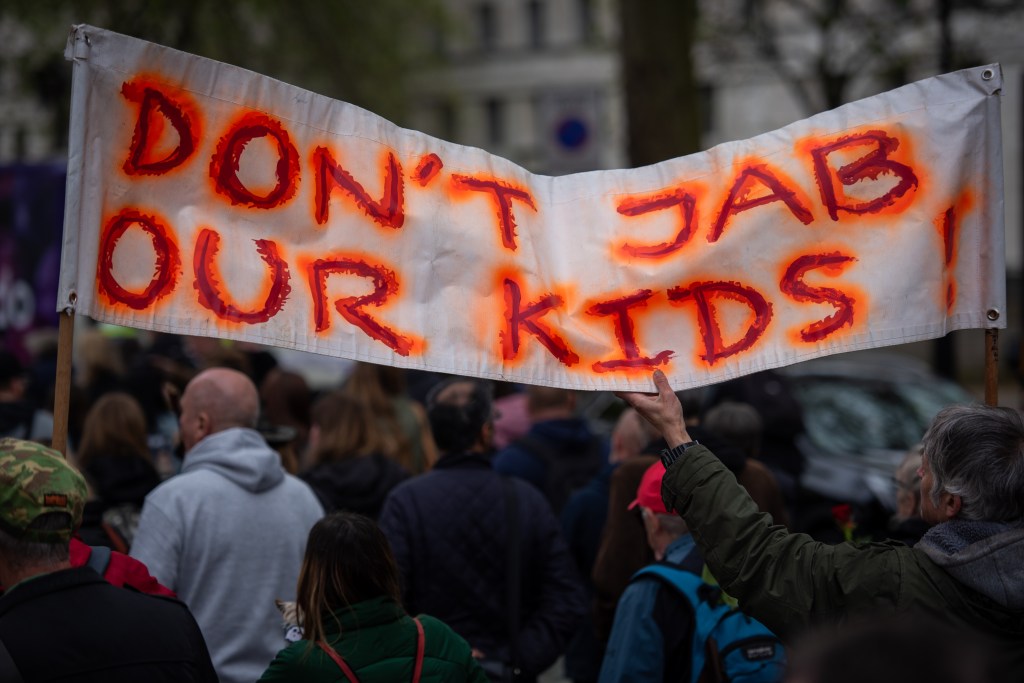German police carried out armed raids in multiple locations in the state of Saxony on Wednesday morning over an alleged plot by radical anti-vaxxers to assassinate the state’s premier.
Five locations were searched in Dresden, the capital of the eastern state, while a sixth was searched in the nearby town of Heidenau, police said in a statement. Five men, aged between 32 and 64, and a 34-year-old woman were under investigation on suspicion of having prepared a serious act of violence against the state, police said.
Videos by VICE
Weapons, including several crossbows, were seized during the raids.
Police said the suspects belonged to a 130-member Telegram chat group called “Dresden Offline Network,” for people opposed to coronavirus vaccines and COVID-19 restrictions.
Members of the group had discussed plans to kill Saxony’s state premier, Michael Kretschmer, and other state government representatives, according to the statement.
The Telegram group was exposed in an investigative report on public broadcaster ZDF’s Frontal show last week, which found members were discussing violent action online and in real-world meet-ups, pledging to use “armed force if necessary.”
The revelations sparked an outcry in Germany, amid growing concern about violence from the country’s radicalised corona-conspiracy milieu, which includes a strong right-wing extremist element. In recent days, there have been a number of volatile protests against coronavirus restrictions across the country, with many police officers injured, including 14 alone in a protest in the town of Greiz, Thuringia on Saturday.
READ: COVID conspiracies are supercharging Germany’s far-right
On Wednesday, Germany’s new chancellor, Olaf Scholz, spoke in parliament to condemn the “corona rebels,” saying the country would “not allow a tiny minority of uninhibited extremists to try to impose its will on the whole of society.”
Experts say the purported assassination plot comes as no surprise, as there have been calls from within the scene for violence since last year. In September, a man with reported links to COVID conspiracy theories and the far-right shot dead a petrol station attendant following a dispute over his refusal to wear a mask.
Meanwhile in Saxony, which has the country’s lowest vaccination rate and the second highest rate of new coronavirus cases, there has been a wave of recent protests against coronavirus restrictions – including one where torch-wielding demonstrators gathered outside the home of the state’s interior minister.
Nicholas Potter, an expert on right-wing extremism at the Amadeu Antonio Foundation in Berlin, told VICE World News that the alleged plot was “alarming but sadly not surprising.”
“The anti-democratic covid-denier movement in Germany has long radicalised to the point of attacking vaccination centres, assaulting journalists or calling for a ‘Nuremberg 2.0’ for politicians and scientists,” he said, adding that since Chancellor Angela Merkel stepped down, Kretschmer had become “public enemy number one” for Saxony’s conspiracy-addled covid-denier movement.
READ: Why COVID conspiracy theorists see this German lawyer as their saviour
Jan Rathje, senior researcher at CeMAS, the Centre for Monitoring, Analysis and Strategy, said that recent events had heightened the sense of urgency among the radicalised COVID conspiracy scene.
“At the moment we see that the debate about mandatory vaccinations, the increasingly repressive measures by the police, and, for some, the disappointment about the political effectiveness of demonstrations increase the apocalyptic mood within the conspiracy-ideological milieu,” he said.
Potter said that “for too long, this danger simply wasn’t taken seriously enough by police, domestic security services and the government.”
The recent concern over the issue has prompted some politicians to call for greater controls over Telegram, the preferred messaging app of the COVID conspiracy movement, to rein in the problem. But Potter said that was unlikely to prove a solution.
“Banning Telegram, even if that were possible, would simply result in the movement flocking to the next messenger platform,” he said. “At the same time, Telegram isn’t necessarily offering people anonymity. An alarming amount of threats and calls for violence is posted under users’ full names – sometimes even with a profile photo.”




